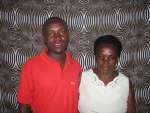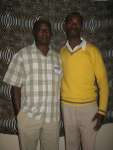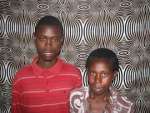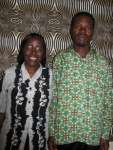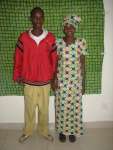Mukankubana Rose & Kwizera Jean Pierre
Mukankubana Rose tells her son about finding strength as an orphan, as a widow, and as a mother, and the secret to raising children in difficult times. Kwizera Jean Pierre is curious about the influence of their older family members, the hardest decision she had to make between education and the love she had for her family, and a book written by his uncle.
Habumukiza Bernard & Mujyanama Eric
Habumukiza Bernard talks to his student, Mujyanama Eric, about the importance of education and his decision to become a teacher, reminding him that the most important aspect of employment isn't always how much money you make.
"When you are at school you have to be united, to know that you are all students from the same
school, you are all Rwandans; you are all young and consider yourself as twins who have the
same mother." Habumukiza Bernard
"What is the secret of doing the same job for a long time?" Mujyanama Eric
Twahirwa Deborah & Tuyishimire Florence
When a large number of children were orphaned by the genocide, it became difficult for many of them to find people to replace their families and get advice from. Twahirwa Deborah tells Tuyishimire Florence the ways orphans can see love and comfort in the world so they can hope for a brighter future, and how all Rwandans must forget about their differences and become one family.
Habineza Pascal & Mwubahamana Shalon
Growing up as an orphan, Mwubahamana Shalon is curious about the life of other orphans and asks her uncle, Habineza Pascal, about how they live. She carefully listens to Habineza Pascal’s numerous experiences with taking care of orphans, as well as his advice. The story is full with Habineza Pascal’s aspirations for his niece and other orphans; to “do good things so that people around you will never see you in that image of being hopeless."
Umamwezi Philomene & Masengesho Rosine
Both Masengesho Rosine and her grandmother have experienced the hardships that women faced, the genocide, and life as orphans. But have never before spoken to one another about their lives. Umamwezi Philomene acknowledges the hurt and suffering women in particular have struggled with in Rwandan history, but sees a bright future for Masengesho Rosine through her youth and educational opportunities. Most importantly, she reminds her that all Rwandans should stand together for justice and peace, and being an orphan does not mean you cannot find a parent to advise you in times of need.
Nyirangendahimana Consolate & Muhire Noel
Muhire Noel wishes to know everything about the family members he was never able to meet, especially his great grandparents, and Nyirangendahimana Consolate tells him stories about each person. Nyirangendahimana Consolate shares a family history that includes her father's love of listening to prayer, lighting her grandfather's cigarettes, and drawing strength from her mother. She also reminds Muhire Noel that the most important thing is to learn to be calm, overcome conflict, and always believe the future is bright.
Mujawiyera Josephine & Habineza Fidei
Habineza Fidei seeks the advice of his adoptive mother about how to plan a family, negotiate difficult situations with his new wife, and preserve important traditions in a changing world. Mujawiyera Josephine remembers being the most beloved of her father's children, and describes the neglect her siblings suffered as the family increased in size. She counsels her son only to have as many children as he can love fully and support financially.
Mudenge Leopard & Manzi Erick
Although Manzi Erick is Mudenge Leopard’s brother, there are many things that he does not know about his sibling’s background. Mudenge Leopard tells his brother about his childhood, how he left home to earn a living, and emphasizes that the most important lesson he learned was to always strive to be on good terms with everyone. Manzi Erick asks important questions about how to get along with all people, including those who do not want to socialize or those from a different generation, and his brother offers advice.
Gahizi Valgas & Nyinawintore Marlaine
Gahizi Valgas begins his story by telling his niece, Nyinawintore Marlaine, about the first time that he realized that he was a refugee. He describes the hardships that he and his family went through because they were not welcomed. He encourages his niece to continue her schooling, because in the past not everyone was given the right to education. He hopes that Nyinawintore Marlaine will fight against anything that could cause another genocide, because he does not want Rwandese to be forced to live as refugees again.
Nyirasamaza Anunciata & Byiringiro Alexis
Nyirasamaza Anunciata and Byiringiro Alexis discuss their family's history, including why Byiringiro Alexis has never met his father, how Nyirasamaza Anunciata met her first and second husband, and what it has meant for both of them that she was widowed. Their loss as a family because of the 1994 genocide and the effects it has had come to the forefront and are openly discussed between mother and son. Byiringiro Alexis admits that he struggles seeing the purpose of continuing his education and asks his mother why he has faced such difficulties in his life.


